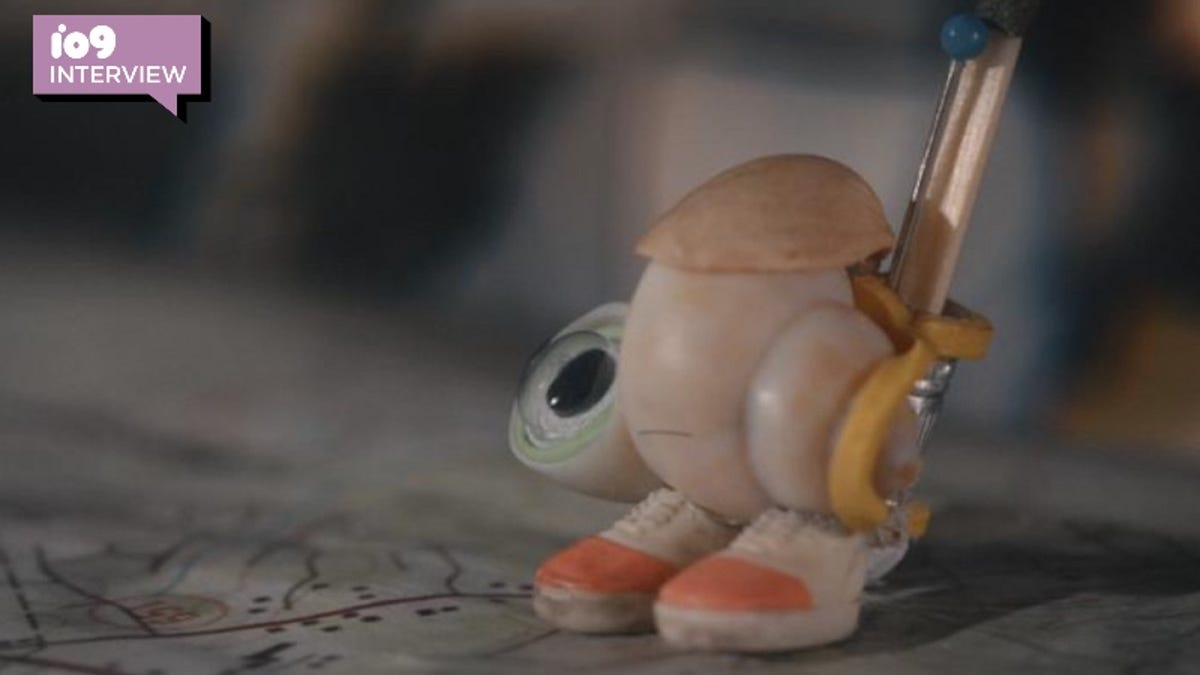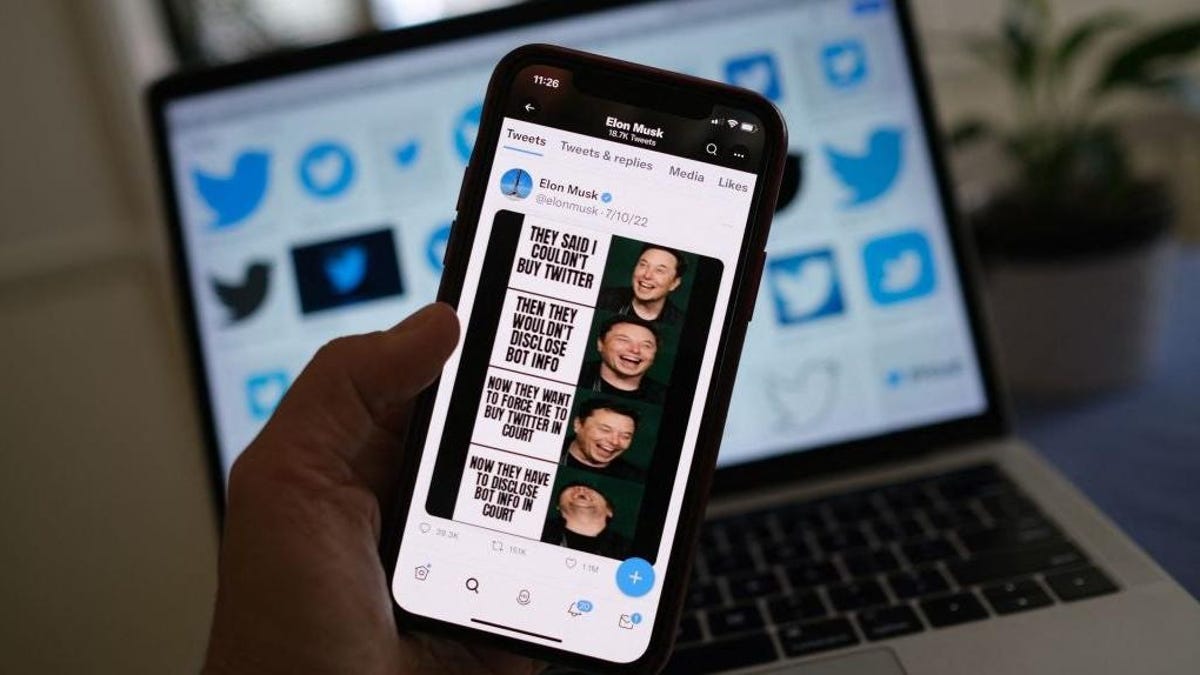[ad_1]

Dean Fleisher Camp, the director of Marcel the Shell With Shoes On, had the best excuse ever to be late to an interview. Last week, at the exact time he was scheduled to talk to io9 about his incredibly charming feature debut, news broke that he’d been hired by Disney to direct a live-action film version of Lilo and Stitch. That’s quite the accomplishment for a filmmaker who, a decade ago, kind of haphazardly made a short film with his friend Jenny Slate, which subsequently was viewed by tens of millions of people on YouTube, and now has been turned into a feature film.
So when Camp did log on (a completely normal and forgivable 10 minutes late, by the way), he was obviously very excited about the Lilo and Stitch news—but also humbled that this tiny idea he had so long ago has become the best-reviewed movie of the year so far, was about to open in theaters nationwide, and got him a job working with the biggest movie studio on the planet.
In Marcel the Shell With the Shoes On, Camp is not only the director, co-writer, and co-creator of the character, he’s the co-star of the film. Marcel follows Camp, playing himself, as a filmmaker who rents an Airbnb and finds this talking sentient shell there. He makes a movie about the shell, it goes viral, and things move on from there.
Speaking with io9, Camp talked about Marcel’s movie origins, the ideas behind the film, how it was influenced by properties like Sesame Street and The Muppets, the experience of going viral, why it was important the film be stop-motion, and more.

G/O Media may get a commission
Germain Lussier, io9: The Marcel shorts first became popular a decade ago, so at what point did you first have the idea for a feature and then when did that idea actually become reality?
Dean Fleisher Camp: When we made the original shorts, I had always wanted to make a feature out of it. I have always loved movies. When I made those shorts I was making my living as an editor, taking the worst editing gigs and I was trying to segue way into being a director. So ultimately, it was always the plan. But when something goes viral, you can get the meetings at all the big studios, but they’re not necessarily interested in trusting you, a first-time filmmaker, to go make the movie that you want to make. And so I walked away from those, and Jenny [Slate, the voice of Marcel and character’s co-creator] felt the same way. Feeling like, “Well, it’s going to be a longer road, but we’re going to do this independently.” And we called our wonderful producer Liz Holm—this is many years after the original—and said, “Okay, we have an idea for this feature.” We, at that point, have been living with the character for a long time and I felt confident we knew how to expand it, but needed to pound on the pavement and find financers. And we very, very fortunately met the folks at Cinereach who financed it and were totally instrumental, not just financially, but creatively as well.
io9: So what was the timing on all that?
Camp: So in 2012, the short came out. We then made two more shorts and a couple of children’s books, and then we didn’t do anything with the character for years. And then calling Liz and being like, “Okay, let’s set up some meetings, how do we do this,” was seven years ago.
io9: Okay, excellent. And like you said, you guys had kind of settled on the story at that point but was it always going to be your story as well as Marcel’s? The meta version of it? Or were there other ideas that you considered?
Camp: There were ideas that we went a little way down exploring that ultimately just felt wrong. And I think Marcel is such a personal character and so dear to me and Jenny, that when we brought Nick Paley, our co-writer, on he was the one that was kind of like “There’s no reason to blow this character out.” Like the studios are recommending they fight terrorism, he gets lost in Paris, all this stuff. And we were kind of like, “There’s no reason to blow it out because he’s already a tiny thing in this giant outside world.” When you put him in outsized-for-a-human circumstances it actually loses what’s unique and special about it.
And so Nick was the first person that articulated it in a way that was like, “Okay, let’s see how little we can actually get away with. How small an adventure can still be an adventure to Marcel and can still really meaningfully explore, these big emotions and existential questions?” And so when Nick came along, that was when we refocused it to be really small. And my character was a natural extension of that.
I don’t like being on camera. I don’t consider myself an actor at all. And so we pitched it with my character having the same subplot roughly, but I wasn’t intended to be on camera when we first pitched it. And then my collaborators, I think rightfully, twisted my arm into it. And even though I really was driving it, I couldn’t argue with the fact that in order for this character to self-actualize, he had to lay down the body armor of this camera and join Marcel as a friend and not just a documentarian.
io9: Plus, I’m sure you work cheaper than a traditional actor.
Camp: Oh, my God. So much cheaper than… I don’t know who’d we get.

io9: In the movie, the Marcel shorts go viral, just as they did in real life. How closely did your experience in real life mirror the experience that you and Marcel, go through in the film?
Camp: We experienced a version of it. I can speak for myself and say I experienced a version of feeling like, “Oh, my gosh, it’s great that all these people are responding to Marcel and they love him.” But when something’s that big, you also get people that are seeing the wrong thing in him or liking it for a slightly wrong reason that makes me, as his creator, feel misunderstood. And so I think that we’re lampooning and exaggerating a little bit, that he is putting up a video that says “Help me find my family” and people are taking selfies outside his house but it was related to that feeling.
I always feel like Marcel, everyone talks about how cute and small he is and that’s what everyone writes about him. [But] I always feel like that’s not even what’s interesting about him. I feel like I have a friend who’s like a 4 foot 11 inches but also brilliant and went to MIT and no one asks him about mechanical engineering. Everyone is just like “Oh, my gosh, you’re so short.”
io9: The film is very matter of fact in that these shells can speak and think and exist. Then even when he gets famous, there’s never a question of like, “Where did he come from?” Did you ever explore that at all or is that very specifically left unanswered?
Camp: It was specifically left unanswered. I felt really committed to not answering it because I just felt like it was beside the point. I wanted to get into the meat of this character and not the superficial shock of, “Oh, my God, there’s a talking shell!” or whatever. And it took a while to convince everyone on our team that it didn’t need that moment. But the tuning fork for me was always the Follow That Bird or The Muppets or Sesame Street where it’s like, “It’s a talking puppet” or “It’s a nine-foot-tall, yellow bird that talks,” but no one’s like, “Oh, my God, what the hell?”

io9: Oh, you’re absolutely right. It doesn’t need to be in there. But the way we consume movies now, every single storyline is always so fully explained, so I was curious
Camp: Yeah. You know what was a really interesting writing lesson? We kept getting that question over and over. We’d do screenings with friends and everyone’s like “How did they meet?” and “What are the rules of this world?” Which is understandable. But finally, I came up with the line where Dean says, “You’ve never talked to anyone before?” and Marcel says “No, people don’t really notice us.” And just that line addresses it, dismisses it, and we can move on with the movie. And we never got that note again.
[Editor’s Note: The next question is a minor spoiler for the film.]

io9: There you go. Now I’m curious about the inclusion of 60 Minutes. Was that in the script from the beginning or did you add it once you knew you could deliver on it? Because it is such a fantastic reveal.
Camp: It was always in there. But you would think with a scrappy, low-budget indie movie, you would make a list of 200 famous news anchors and maybe one would get back to you. But our list was just always one name long, and it always just said “Lesley Stahl.” It was a leap of faith a little bit.
The way that we made the film in the really long production timeline, though, allowed us to have that in there and be actively trying to get a version of the film in front of her for a while before we would have had to rewrite it or something. And luckily, our wonderful producer, Liz Holm, had an in at 60 Minutes. So we were able to get the animatic, which was just like the storyboards and the audio, in front of Leslie and she liked it.
[END SPOILER]
io9: Oh, it’s a lovely, lovely reveal. Now when A24 came on board after the film debuted at Telluride, did you always know you wanted to go theatrical? I mean, it’s based on an online short. It could have very easily been a streaming movie. So tell me about that decision.
Camp: I grew up loving movies. I went to film school. I’m a movie nerd. And I always wanted this film to have a theatrical release. But it did seem like, especially during covid when we were finishing it, it felt like, “Okay, well, theatrical is out the window.” And I am so grateful that we were able to put it in theaters. I think it’s such a different experience because for decades now, people have sort of been trained to feel like you should save theatrical for the big spectacle films. That’s a movie you have to see on a big screen. But I think what is missing from that conversation is comedies are so much better with a group of people. Horror movies are so much better with a group of people. And there’s a lot that isn’t the literal spectacle of the film or the budget or action sequences that is an incredible connective reason to go see a film in a movie theater.

io9: Oh, absolutely. Now I read a lot of other interviews about how you made this film in a technical sense, which is why I’m not going to ask about it, but it sounded very difficult. That made me wonder, in transitioning the character from YouTube to the big screen, was there ever a consideration of trying to make the movie using CGI instead of stop-motion? Obviously, that would go against the character’s roots but maybe it would have been easier?
Camp: I think it might have been cheaper. [Laughs] I don’t know. You’d have to ask the producers. It certainly would have been less technically demanding or challenging. [But] I think that yeah, he started off as stop motion, and while a few movies prove that really good CG artists can pretty, pretty well mimic the look and aesthetic of stop motion, what I felt is always missing from those is I was committed to making this movie as much like a documentary as possible. I prioritized, and I’m really proud of us when watching the film, about how many mistakes there are and about how that gives it a more emotional feeling. Stop motion, you can mimic the look in a CG approach, but you can’t bake in mistakes if you couldn’t anticipate them, which is sort of the definition of a mistake. And stop motion has all that stuff because it is an actual tactical process. It’s imprecise. And when you have a character like Marcel, who’s sort of making due in a world of challenges, that imprecision, I think, gives it a really relatable emotionality.
io9: Okay, so, last thing. You’ve got the best-reviewed film of the year so far, and deservedly so. You’re going wide this weekend. Tell me what you think of the reviews and how you’ve been feeling the past couple of weeks?
Camp: It’s been really amazing and flattering and incredible to read how positive the reviews have been. And surprising, honestly. It’s so rare that a movie is pretty unanimously praised. It actually makes me a little freaked out or something like it’s fake. [Laughs] I’m constantly questioning whether I’m in a coma. But it’s been great. It’s been great.
A lot of this movie was made with a hope and a prayer. And it was made in a really unorthodox way with the aim that at the end of it, we would arrive at a movie that really moved people. And even though there’s this whole technical process going on, we all had our fingers crossed that that would result in something that doesn’t feel technical or mechanical, but feels organic and emotional and really reaches people. And so I think that yeah, it’s amazing. And it gives me a lot of confidence in artistic vision, and the ability for art to connect people. They’re clichés that sound dumb when you say them out loud. but they’re very true to me right now.
Marcel the Shell With Shoes On is now in theaters everywhere.
Want more io9 news? Check out when to expect the latest Marvel and Star Wars releases, what’s next for the DC Universe on film and TV, and everything you need to know about House of the Dragon and Lord of the Rings: The Rings of Power.



